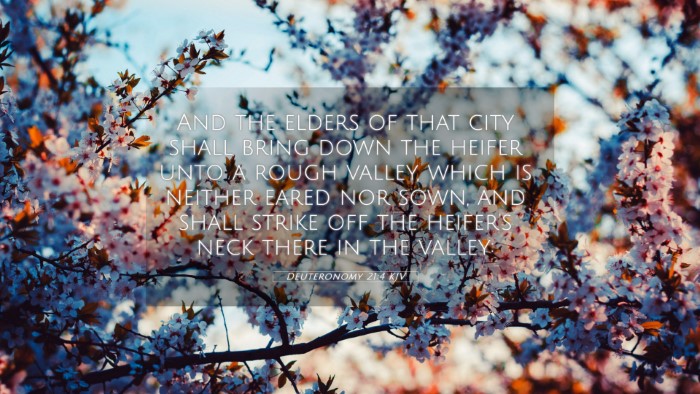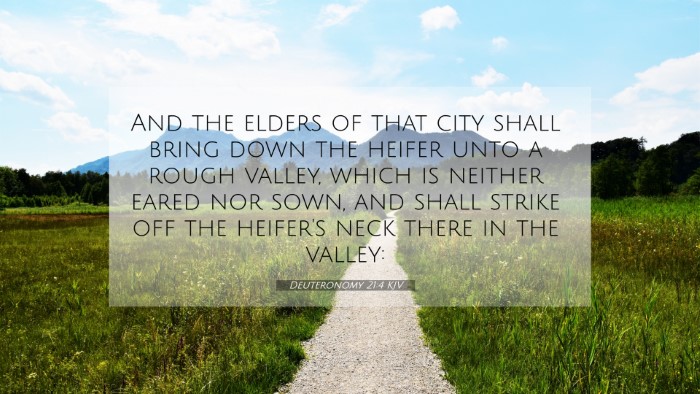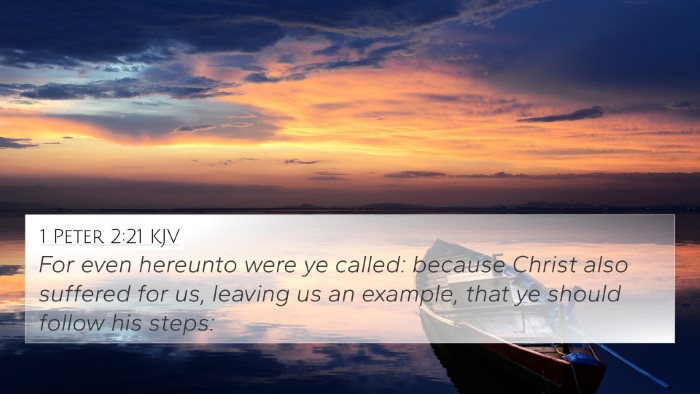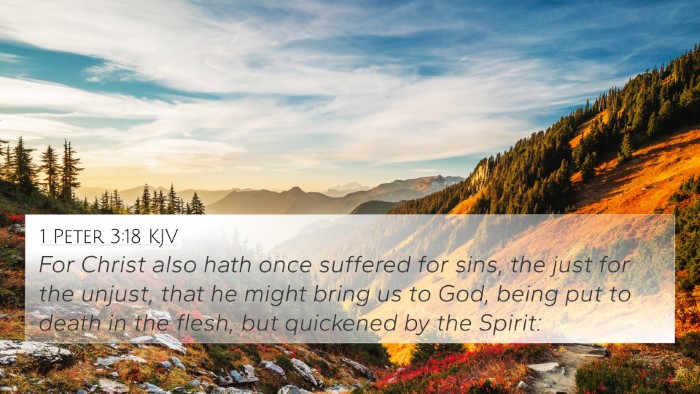Understanding Deuteronomy 21:4
The verse Deuteronomy 21:4 bears significant implications regarding justice, rituals, and community responsibility in ancient Israel. It reads:
"And the elders of that city shall bring down the heifer unto a rough valley, which is neither eared nor sown, and shall strike off the heifer's neck there in the valley."
Summary of Interpretations
This verse is part of a broader category of laws concerning the procedures for dealing with an unsolved murder. The reference to the heifer signifies a ritual meant to absolve the community from guilt for the shedding of innocent blood. Let’s break down the meanings as derived from public domain commentaries by renowned scholars.
Matthew Henry's Commentary
Matthew Henry emphasizes that this law reflects the sacredness of innocent blood and the communal responsibility for crimes. He highlights:
- The act of a heifer being sacrificed is symbolic, representing the community’s need to atone for an unaddressed grievance.
- The elders play a crucial role as they embody the collective wisdom and authority tasked with upholding justice.
Albert Barnes' Notes on the Bible
Albert Barnes further elucidates the symbolic act of killing the heifer. He notes that:
- The rugged valley, untouched by cultivation, symbolizes purity and the necessity of dealing with the sin outside the community's settled life.
- This procedure connects to God’s requirements for justice and purity among His people.
Adam Clarke's Commentary
According to Adam Clarke, this act not only serves as a ritualistic cleansing but also involves specific procedural expectations:
- The heifer’s neck being struck off must happen in a designated place, which emphasizes the importance of proper context and authority in justice.
- Clarke highlights that such rituals underscore the seriousness of bloodshed and the communal effort needed to restore holiness.
Cross-References and Thematic Connections
This verse is interwoven with various Biblical themes and other verses, particularly in relation to justice, community responsibility, and atonement. Here are key Bible verses cross-referenced with Deuteronomy 21:4:
- Exodus 21:30 - Discusses the importance of restitution and consequences for wrongful death.
- Numbers 35:33-34 - Highlights the pollution of the land by innocent blood and the necessity of purification.
- Matthew 23:35 - Jesus speaks of the blood of the righteous being demanded by that generation, reflecting on the seriousness of guilt and accountability.
- Hebrews 9:22 - Discusses the necessity of blood for the remission of sin, linking ritual sacrifice to atonement.
- Genesis 9:6 - Establishes the principle of life for life, emphasizing the weight of murder and responsibility.
- Leviticus 17:11 - Connects the concept of atonement through blood, which carries profound theological implications.
- 2 Samuel 14:11 - Relates a story that reflects on justice and community judgment, drawing parallels to community responsibility.
Theological Implications
The implications of Deuteronomy 21:4 extend into modern discussions on justice, community ethics, and the weight of blood guilt. Scholars offer insights on:
- Community versus Individual Responsibility: This verse compels acknowledgment of collective guilt in the face of wrongs that fester within a community.
- The Role of Elders: Elders represent the authority figures tasked with civil and spiritual governance, akin to the roles of church leaders today.
Practical Applications for Today's Readers
In structuring our understanding of communal ethics and justice, Deuteronomy 21:4 serves as a call for:
- Deepening communal engagement in ethical decision-making.
- Recognizing the importance of historical and cultural contexts in Scripture.
- Fostering accountability within communities to heal visible and invisible wounds.
Conclusion
Deuteronomy 21:4, while rooted in ancient Israelite law, encapsulates timeless principles regarding justice and communal duty that resonate deeply in contemporary Christian thought. Understanding this verse through various commentaries enhances our engagement with the text and encourages reflection on our communal responsibilities today.
Further Study Resources
For those interested in exploring cross-referencing Biblical texts, there are numerous tools and resources available:
- Bible Concordance - Useful for identifying themes and related scripture.
- Bible Cross-reference Guide - A systematic way to explore connections.
- Bible Reference Resources - Comprehensive tools for deeper study.




